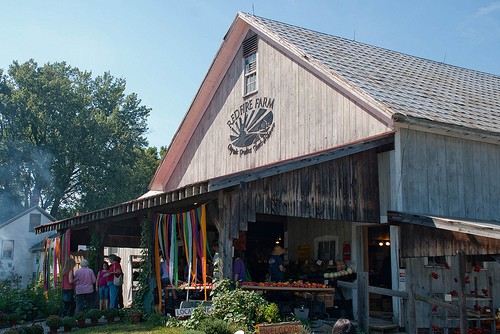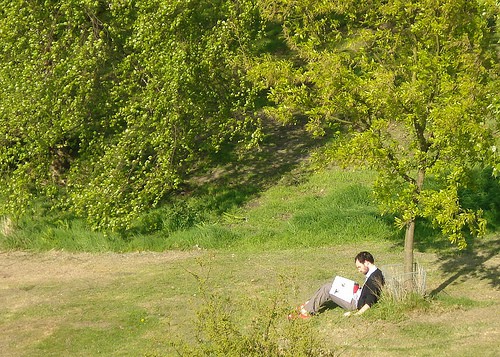The Ivy League Farmer
Earlier this summer, Julie and I attended a dinner at Red Fire Farm, a 110 acre organic farm in rural Granby, Massachusetts. The dinner celebrated the strawberry harvest and the farmhands had setup tables under a tent overlooking the fruit fields. As we poured our wine, the farm’s owner, Ryan Voiland, stood up to say a few words about this year’s harvest.
Ryan is young, only in his early thirties, a fact he tries to hide with a grizzled black beard. As he spoke, his few words stretched into an enthusiastic dissertation on rain fall and cabbage yields. Eventually, Ryan’s wife, Sarah, took over, leading the group in a prayer to the “earth goddess.” As we sipped strawberry gazpacho, a group of college-aged farm interns formed a song circle in a patch of grass near the chicken coop.
In the comfort of cynical Boston, the event would have felt over the top, but in the shaded fields of Granby, it made sense. When I looked over to the main table, I saw Ryan take in the scene. He was smiling.
What makes Ryan’s story canonical is its start. Ten years earlier, he walked out of Cornell University with an Ivy League diploma in his hand and headed straight into the offices of the Farm Service Agency, where he secured a loan to buy his first farm property. A decade later, Red Fire is a success: it sells organic produce straight to the consumers through farmers markets and a sold-out CSA. When I last visited the farm, in mid-August, they were installing a $200,000 solar array. Ryan loves what he does and does it well.
The Dream Job Trope
Ryan has a dream job — which I define to be an occupation built around a hobby or casual side interest that you enjoy. (Growing up, Ryan loved to garden, so, naturally, he started a farm.)
The dream job is a powerful trope in the job satisfaction literature. For example, here’s the opening paragraph from a popular career advice guide:
“[A] New York investment banker becomes a small-town college chef. A college professor becomes a chocolatier. An entrenched corporate exec…converts to the ministry.”
These are all dream jobs. When Tim Ferriss tells his famous story of an attorney who drops everything to open a Brazilian surf shop, that’s also a dream job, as are most of the examples touted in the perennially popular quit your terrible cubicle job to start a business advice guide niche.
You like to cook? Become a chef! Love chocolate? Open a chocolate shop! Like surfing on exotic beaches? Open a surf shop! And so on.
We’re entranced by dream jobs. When we hear stories like the one that opened this post, we feel a rush of aspiration. Hundreds make a living writing books and blogs about mustering the courage to pursue dream jobs, and millions dedicate their day dreaming to the topic. In this post, however, I want to argue that this is a problem.
The dream job trope isn’t the path to job satisfaction, and it’s not just harmless wistful thinking: it’s instead downright dangerous.



